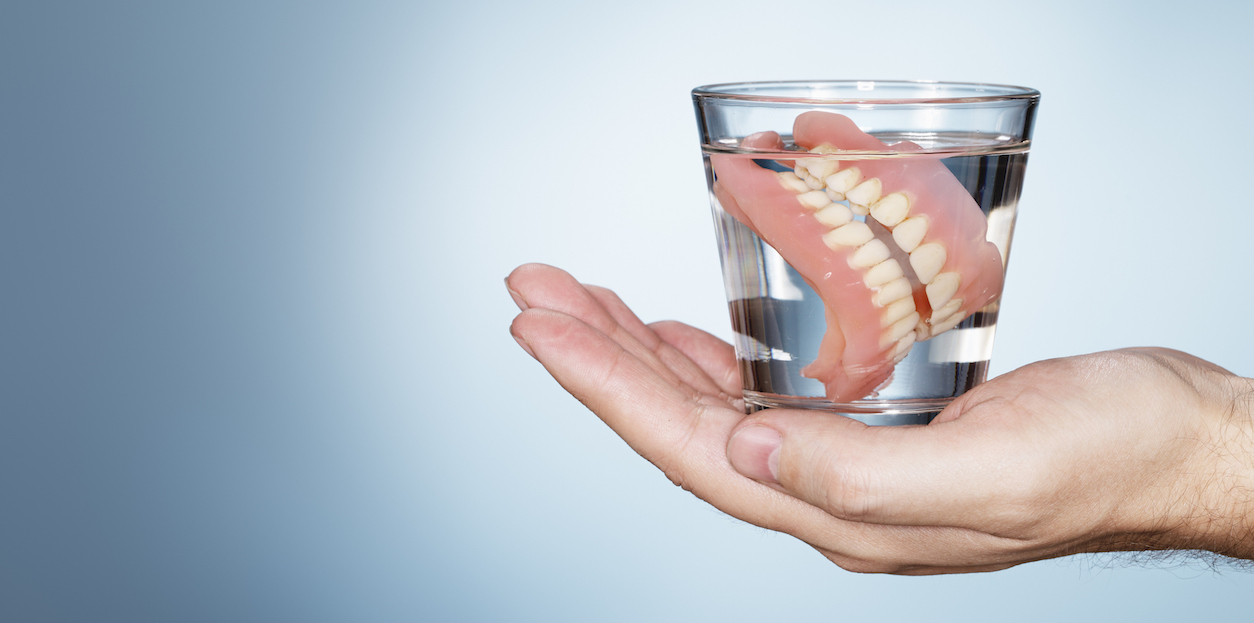Dentures – Everything you Need to Know
False teeth and dentures have been around for decades, but they’ve been transformed over the years. Technicians now make dentures that look more like natural teeth and fit more comfortably. However, investing in dentures is still a big decision that needs researching.
Types of Dentures and Adhesives
There are two main types of dentures – full and partial.
Full (complete) dentures
Full conventional dentures are usually fitted 12 weeks after a dentist has extracted any remaining natural teeth and the gums have had time to heal. Once the dentures are fitted, they shouldn’t need any major adjustments. An immediate denture is fitted straight after extractions so they require adjusting after the gums have healed.
Partial dentures
When a patient has viable natural teeth, it’s possible to keep them and have partial dentures made for the missing teeth. The denture is ideal for aesthetics and also helps keep existing teeth in place so they don’t shift into the spaces left by fallen or extracted teeth. A gum-coloured plastic base and metal skeleton holds a partial denture in place.
Denture Adhesives
When dentures are well-fitted and maintained, most people don’t require adhesive. But an adhesive paste or powder can help keep dentures in place and improve the comfort while the gums get used to new dentures.
Caring for your Mouth with Dentures
Basic dental hygiene can keep your mouth and dentures in good health and condition.
Just as you brushed your teeth twice daily, you need to continue to care for your mouth with dentures. Brush your gums, tongue and roof of your mouth twice daily. The brushing stimulates circulation in the tissue and removes bacteria and plaque from the mouth.
It’s important not to wear dentures all day and night. Removing dentures for at least six hours per day gives the gums time to rest and for dentures to be thoroughly cleaned. Over 18 hours of wear each day increases the chance of gum irritation, sore spots and jawbone loss. But not wearing dentures for enough hours per day can cause irritated gums when they’re worn.
Mouth Problems
Your mouth is more likely to experience problems when wearing dentures compared to healthy natural teeth. These problems can include:
- Ulcers or sores
- Bleeding gums
- Swollen gums
- Gum abscess
- Cracks in the corner of the mouth
- Bad breath
Rinsing your mouth regularly with a salt wash can improve sores. Dissolve half a teaspoon of salt in warm water and rinse every few hours to help soothe and heal the mouth. If any gum problems persist, see your prosthodontist.
Caring for Dentures
Dentures don’t last forever, but with good care you can ensure they have a long life. Just like teeth, dentures suffer from wear and tear and from poor dental hygiene. Eating hard or highly acidic foods can cause wear and breakages.
Removing your dentures for the night is an ideal time to do a little maintenance. Hold your dentures over a bowl of water so they don’t break if dropped. Use a soft toothbrush with a mild soap and water or denture paste to brush all over the dentures. Don’t use toothpaste as it’s too abrasive. Leave the dentures in a cup of water or dry overnight. If you see any plaque build-up on the dentures, soak them in a diluted vinegar mix or have them professionally cleaned and polished. Rinse in fresh water before fitting the next day.
The shape of the mouth changes with age. With no natural teeth, the jawbone is prone to resorption and bone loss. The changing gum and jawbone can mean dentures don’t fit as well as they did previously and may need to be relined or replaced. A check-up and reline every two years will ensure dentures are well-fitted and comfortable.
As soon as you notice your dentures are damaged or don’t fit properly, visit your prosthodontist for the dentures to checked and relined. Don’t attempt to repair or reline dentures yourself.
Potential Problems with Dentures
Most people don’t experience any major problems with dentures but there is a small percentage who report difficulties with their dentures even after the early stage.
Allergies
There is a slight chance of an allergic reaction to the denture products or adhesive. Dentures are made from a variety of materials including acrylic, nylon, colour pigment and metal materials which are to cause allergies in a small percentage of the population.
Problems with Eating
When you’re new to dentures, eating can be difficult and takes time to get used to. Eating a soft diet of soups and stews and slowly introducing harder foods can help. Some people prefer to eat fewer hard foods than they did with their natural teeth.
Dentures are an aesthetic, cost-effective option if you have lost some or all of your natural teeth. With basic dental care, dentures can be long-lasting and comfortable to wear.
If you have any queries about dentures, call us on (08) 9321 1632 or book an appointment.

